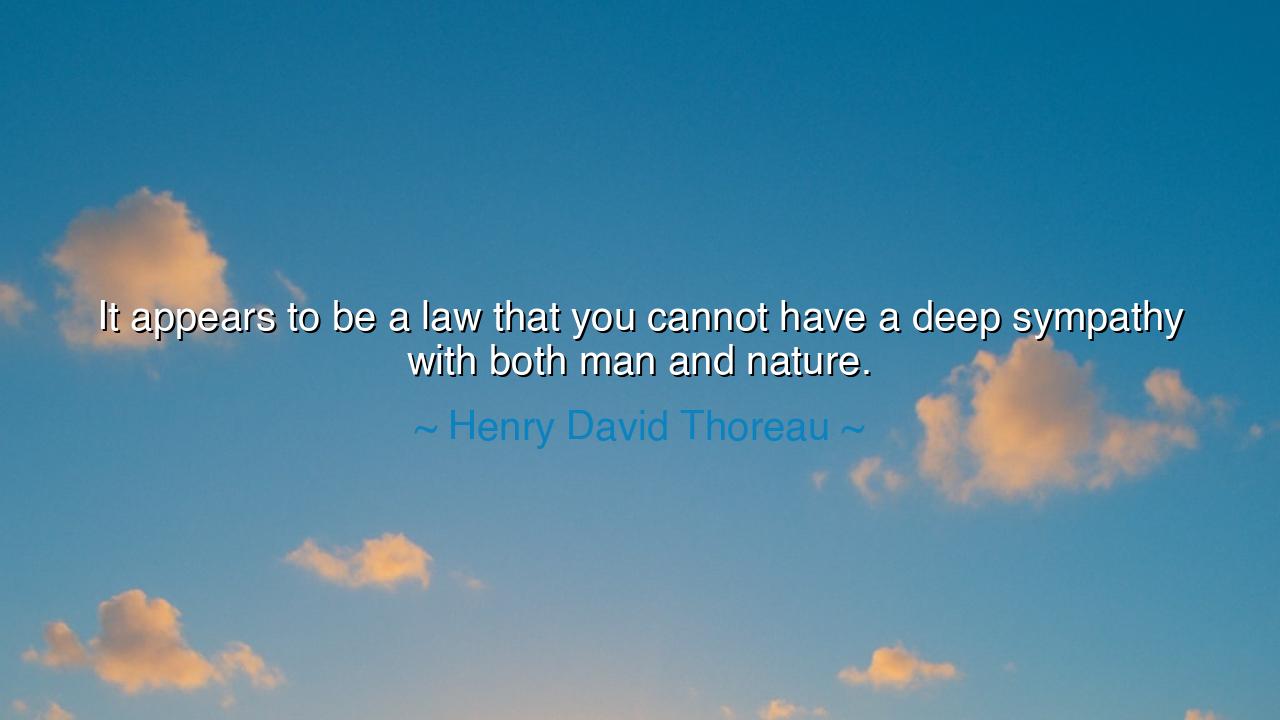
It appears to be a law that you cannot have a deep sympathy with






In a voice like pine-wind over still water, Henry David Thoreau murmurs: “It appears to be a law that you cannot have a deep sympathy with both man and nature.” Hear how the sentence steps gently yet cuts to the bone. He does not deny affection for either; he warns that when the heart goes very far in one direction, it begins to lose the music of the other. To love wilderness with a total ardor may cool one’s patience for the city’s clamor; to love the city with unblinking devotion may make the forest seem mere raw material. Thoreau speaks as a watcher on the threshold, confessing the strain he felt between society and solitude, between neighbor and night-wood, between the crowded road and the path of leaves.
The word law here is not statute but tendency—an ache in the hinge of the human spirit. Deep attention is jealous; it asks for long hours and single-minded listening. When Thoreau bent his ear to Walden’s shore, every ripple had a syllable, every pine a paragraph; the grammar of the pond demanded the devotion that towns and committees also claim. Thus he found what many pilgrims discover: to keep the covenant with nature is to keep a distance from the pageants of man; to be fully present for the one is to be partially absent from the other. Our loyalties are finite; our hours cannot be multiplied.
Lift a lamp from history to see the tension with sharper edges. When John Muir pleaded for Hetch Hetchy, he spoke as a prophet of valleys—“dam Hetch Hetchy? As well dam the people’s cathedrals.” Across the bay, a thirsty San Francisco pled for water after fire and earthquake. Two deep sympathies faced one another: devotion to a living sanctuary, devotion to a wounded city. The city won; the valley drowned under a reservoir’s mirror. Neither side was heartless. Each loved something worth saving, yet the loves were not reconcilable in that hour. Here the Thoreauvian “law” stood visible as granite: your deepest loyalty will guide your hand—and close your fist to what lies outside its circle.
And yet, the story is not only of rupture. There are seasons when the circle widens. Think of Wangari Maathai and the Green Belt Movement: planting trees to bind soil, cool streets, and mend livelihoods. Or Aldo Leopold, whose land ethic asked towns and fields to see themselves as members of a biotic community. These lives do not overturn Thoreau’s observation so much as qualify it: while a single human heart may not hold equal, undivided deep sympathy for both man and nature at once, a wise culture can design its work so that mercy to one becomes mercy to the other. Where craft and policy braid the two, the strain eases—even if it never disappears.
Thus the meaning ripens: Thoreau is not ordering us to choose contempt; he is urging us to choose clarity. Know the depth and direction of your primary love, lest you pretend a neutrality you do not possess. If your soul belongs to rivers, admit it—and speak for them boldly, because cities already have many tongues. If your calling is to households and wages, admit it—and insist that the city live by terms that do not murder its watershed. Honesty about our partiality helps the forum bargain in good faith; dishonesty makes us cruel without noticing.
What practices flow from this? First, learn the art of alternation. Give the week to man and the Sabbath of senses to nature; let each correct the other. Second, shape your labor so that it carries a double dividend: builders who leave room for floodplains, farmers who armor soil with cover crops, planners who stitch green corridors through brick. Third, make proximity your teacher—know the names of your street’s people and your county’s birds; repair both a neighbor’s fence and a trail’s washed-out switchback. In these small braids, the antagonism softens.
Carry the lesson like a compass: your heart is limited, your duties are many, and your place in the choir is particular. You may not hold perfect deep sympathy for both man and nature at the same instant—but you can live so that neither is betrayed. Let your choices confess your first love while your structures honor your second. Then, when the world asks whom you serve, you may answer without shame: I serve the living whole—by standing guard first where I am called, and by building bridges where my love falls short. In this way, Thoreau’s severe law becomes not a sentence of division, but a summons to wise design and truthful devotion.






AAdministratorAdministrator
Welcome, honored guests. Please leave a comment, we will respond soon